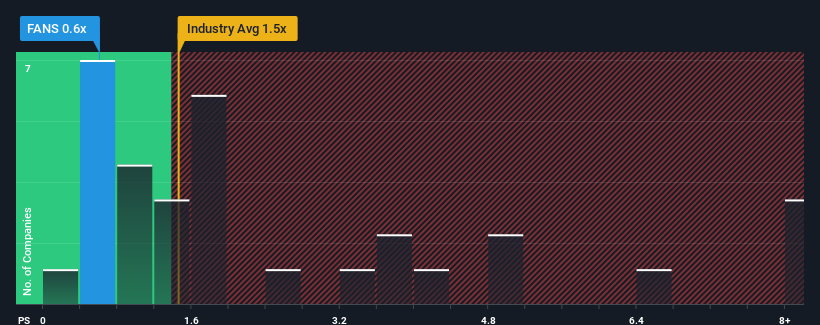Stock Analysis
- Canada
- /
- Hospitality
- /
- TSX:FANS
Investors Aren't Buying FansUnite Entertainment Inc.'s (TSE:FANS) Revenues

FansUnite Entertainment Inc.'s (TSE:FANS) price-to-sales (or "P/S") ratio of 0.6x might make it look like a buy right now compared to the Hospitality industry in Canada, where around half of the companies have P/S ratios above 1.9x and even P/S above 6x are quite common. Although, it's not wise to just take the P/S at face value as there may be an explanation why it's limited.
See our latest analysis for FansUnite Entertainment

How Has FansUnite Entertainment Performed Recently?
As an illustration, revenue has deteriorated at FansUnite Entertainment over the last year, which is not ideal at all. Perhaps the market believes the recent revenue performance isn't good enough to keep up the industry, causing the P/S ratio to suffer. If you like the company, you'd be hoping this isn't the case so that you could potentially pick up some stock while it's out of favour.
Want the full picture on earnings, revenue and cash flow for the company? Then our free report on FansUnite Entertainment will help you shine a light on its historical performance.How Is FansUnite Entertainment's Revenue Growth Trending?
The only time you'd be truly comfortable seeing a P/S as low as FansUnite Entertainment's is when the company's growth is on track to lag the industry.
In reviewing the last year of financials, we were disheartened to see the company's revenues fell to the tune of 13%. Spectacularly, three year revenue growth has ballooned by several orders of magnitude, despite the drawbacks experienced in the last 12 months. Therefore, it's fair to say the revenue growth recently has been superb for the company, but investors will want to ask why it is now in decline.
Comparing the recent medium-term revenue trends against the industry's one-year growth forecast of 193% shows it's noticeably less attractive.
In light of this, it's understandable that FansUnite Entertainment's P/S sits below the majority of other companies. It seems most investors are expecting to see the recent limited growth rates continue into the future and are only willing to pay a reduced amount for the stock.
The Final Word
We'd say the price-to-sales ratio's power isn't primarily as a valuation instrument but rather to gauge current investor sentiment and future expectations.
In line with expectations, FansUnite Entertainment maintains its low P/S on the weakness of its recent three-year growth being lower than the wider industry forecast. At this stage investors feel the potential for an improvement in revenue isn't great enough to justify a higher P/S ratio. Unless the recent medium-term conditions improve, they will continue to form a barrier for the share price around these levels.
Before you settle on your opinion, we've discovered 4 warning signs for FansUnite Entertainment (2 are a bit unpleasant!) that you should be aware of.
If companies with solid past earnings growth is up your alley, you may wish to see this free collection of other companies with strong earnings growth and low P/E ratios.
Valuation is complex, but we're helping make it simple.
Find out whether FansUnite Entertainment is potentially over or undervalued by checking out our comprehensive analysis, which includes fair value estimates, risks and warnings, dividends, insider transactions and financial health.
View the Free AnalysisHave feedback on this article? Concerned about the content? Get in touch with us directly. Alternatively, email editorial-team (at) simplywallst.com.
This article by Simply Wall St is general in nature. We provide commentary based on historical data and analyst forecasts only using an unbiased methodology and our articles are not intended to be financial advice. It does not constitute a recommendation to buy or sell any stock, and does not take account of your objectives, or your financial situation. We aim to bring you long-term focused analysis driven by fundamental data. Note that our analysis may not factor in the latest price-sensitive company announcements or qualitative material. Simply Wall St has no position in any stocks mentioned.
About TSX:FANS
FansUnite Entertainment
FansUnite Entertainment Inc. operates as a sports and entertainment company.
Mediocre balance sheet and slightly overvalued.

